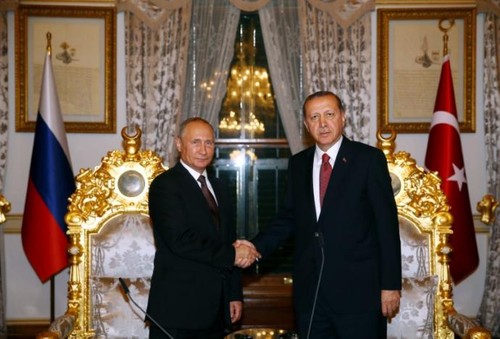(VOVworld) – Russia and Turkey have signed an agreement on the construction of an undersea gas pipeline. They have also pledged to reach a common voice on the Syria crisis. The moves show their willingness to normalize their relationship after Turkey shot down a Russian warplane near the Syrian border in November, 2015.
 |
Russian President Vladimir Putin (L) shakes hands with his Turkish counterpart Tayyip Erdogan during their meeting in Istanbul, Turkey, October 10, 2016.
(photo: Kayhan Ozer/Presidential Palace/Handout via REUTERS) |
During a visit to Turkey, Russia’s President Vladimir Putin and Turkey’s President Tayyip Erdogan signed an agreement on the construction of an undersea gas pipeline called TurkStream. The project involves two pipelines, each with the capacity to carry 15.75 billion cubic metres of gas a year. One line will transport gas to Turkey on the bed of the Black Sea and the other will carry gas from Turkey to European countries. The construction is scheduled to finish in 2019. Russia will build and own the lines.
The TurkStream project is a positive move for Russia and Turkey, who are experiencing economic problems and difficult relations with the West. Russia will strengthen its position in Europe’s natural gas market and reduce the risk of transporting gas to the EU via Ukraine. Turkey will benefit from cheap gas prices and thousands of new jobs from this project.
The TurkStream project, which will cost about 11.4 billion Euros, was introduced in December, 2014, during a previous Putin visit to Turkey. After Turkey shot down a Russian warplane in November, 2015, Russia decided to suspend the project. After Turkey publicly apologized to Russia in August, Russia began considering reviving the project.
During a one-day visit to Turkey by Putin, the two sides agreed to restart the construction of a nuclear power plant in Turkey. Moscow announced it would lift its sanctions on Turkey’s food. The two leaders pledged to pursue full normalization of bilateral ties.
In Syria, Moscow is a key ally of President Bashar Al-Assad’s administration, while Ankara supports the rebels trying to overthrow him. But the two Presidents agreed on the need for humanitarian work in Aleppo, a fierce battle ground between government and rebel forces.
Putin’s visit to Turkey clearly is an effort to restore bilateral ties, resolve differences, and seek economic opportunities for mutual benefit.